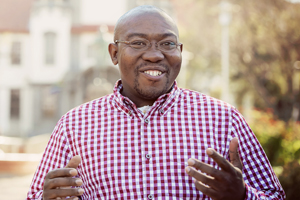 Prof Oriel Thekisoe Prof Oriel Thekisoe
Photo: Sonia Small |
Prof Oriel Thekisoe from the UFS was named recipient of the prestigious TW Kambule NRF-NSTF Award. The announcement was made during the 16th Annual NSTF-BHP Billiton 2013/2014 Awards Gala Dinner held in Johannesburg on Thursday 3 July 2014.
Prof Thekisoe is an Associate Professor in the university's Department of Zoology and Entomology at the Qwaqwa Campus.
He has been recognised as an emerging researcher for his outstanding contribution to Science, Engineering and Technology (SET).
"It is a great honour for the university to learn that Prof Thekisoe has won the award of the National Science and Technology Forum. This is a very competitive award and speaks of the quality and depth of talent at the UFS as we prepare the next generation of scientists and scholars,” said Vice-Chancellor and Rector of the UFS, Prof Jonathan Jansen.
"I hope that the award will inspire our current science students to work harder in pursuing the discovery of new methods and techniques which will improve our livelihoods,” Prof Thekisoe said after receiving the award from the Minister of Science and Technology, Ms Naledi Pandor. “I am grateful to the Dean of the Faculty of Natural and Agricultural Sciences, Prof Neil Heideman, for believing in me. I am also grateful to my former lecturers, Profs Peter Mbati, who is now the Rector of the University of Venda, and Noboru Inoue, from Japan’s Obihiro University, for grooming and inspiring the scientist in me.”
"Prof Thekisoe is at the forefront of the research development activities at the Qwaqwa Campus,” said Prof Corli Witthuhn, Vice-Rector: Research at the UFS. “He serves as a mentor to many of the younger scholars on the campus. As one of the Vice-Chancellor's Prestige Scholars at the university, he has the potential to become one of the most prominent researchers in his field in the country."
The Vice-Chancellor’s Prestige Programme (PSP) supports the accelerated scholarship of junior UFS researchers in the first five years after obtaining their PhDs. The prestige scholars participate in an intensive programme of support that includes international placement and intensive mentorship.